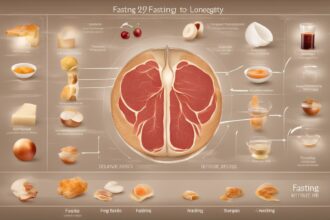Have you ever wondered if the secret to a longer, healthier life could be as simple as skipping a few meals? The concept of fasting for a long life has gained traction in recent years, with science backing up what ancient cultures have known for centuries. fasting, whether intermittent or prolonged, isn’t just a trendy diet—it’s a powerful tool that may help slow aging, improve metabolic health, and enhance overall well-being. In this post, we’ll dive deep into how fasting can contribute to longevity, explore the science behind it, and share practical tips to incorporate fasting into your lifestyle. Let’s unlock the potential of fasting and aging gracefully together!
What Is Fasting and How Does It Relate to Longevity?
Fasting is the voluntary abstention from food and sometimes drink for a specific period. It comes in many forms, such as intermittent fasting (IF), time-restricted eating, or extended water fasts. But how does this practice tie into living a longer life? The idea of fasting long life stems from research showing that caloric restriction and fasting mimic similar biological responses in the body, triggering mechanisms that protect cells, reduce inflammation, and promote repair. Studies on animals and humans suggest that fasting can influence aging pathways, potentially extending lifespan and healthspan—the number of years we live in good health.
The Science Behind Fasting and Longevity
The connection between fasting and a longer life isn’t just anecdotal; it’s rooted in fascinating science. When we fast, our bodies enter a state called ketosis, where they burn fat for fuel instead of glucose. This metabolic shift activates processes like autophagy, a cellular “clean-up” mechanism that removes damaged cells and proteins, which are linked to aging and disease. Research published in journals like Cell Metabolism shows that fasting can lower insulin levels, reduce oxidative stress, and improve mitochondrial function—all key players in slowing the aging process. While human studies are still evolving, early data on fasting benefits longevity is promising, with some trials indicating reduced risks of age-related diseases like diabetes and heart disease.
Key Benefits of Fasting for a Long Life
Fasting offers a range of benefits that go beyond weight loss, many of which directly support the goal of a longer, healthier life. Here are some standout advantages of incorporating fasting into your routine:
- Improved Metabolic Health: Fasting helps regulate blood sugar and insulin sensitivity, reducing the risk of type 2 diabetes, a major factor in aging.
- Enhanced Brain Function: Fasting boosts the production of brain-derived neurotrophic factor (BDNF), which supports cognitive health and may protect against neurodegenerative diseases.
- Reduced Inflammation: Chronic inflammation accelerates aging, but fasting lowers inflammatory markers, supporting overall wellness.
- Cellular Repair: Through autophagy, fasting helps clear out damaged cells, potentially delaying age-related decline.
Different Types of Fasting for Longevity
Not all fasting methods are created equal, and finding the right approach for fasting long life depends on your lifestyle and health goals. Intermittent fasting, such as the 16:8 method (fasting for 16 hours, eating during an 8-hour window), is popular for its simplicity and sustainability. Alternate-day fasting, where you eat normally one day and restrict calories the next, is another option with strong research backing for longevity. For those seeking deeper benefits, extended fasts of 24–72 hours can amplify cellular repair processes, though they require more preparation and medical supervision. The key is to start small and experiment with what works best for you while prioritizing fasting health benefits.
Practical Tips to Start Fasting for a Longer Life
Ready to harness the power of fasting for longevity? It’s easier than you might think, but a thoughtful approach ensures safety and success. Below are actionable steps to get started on your fasting and aging journey:
- Start Slow: If you’re new to fasting, begin with a 12:12 schedule (12 hours fasting, 12 hours eating) before progressing to longer fasts.
- Stay Hydrated: Drink plenty of water during fasting periods to support your body and curb hunger pangs.
- Focus on Nutrient-Dense Foods: When breaking your fast, prioritize whole foods like vegetables, lean proteins, and healthy fats to maximize benefits.
- Listen to Your Body: If you feel dizzy or unwell, ease off and consult a healthcare provider—fasting isn’t one-size-fits-all.
- Be Consistent: Longevity benefits come from regular practice, so aim to make fasting a sustainable part of your routine.
Potential Risks and How to Fast Safely
While the idea of fasting for a long life is exciting, it’s not without potential pitfalls. Fasting can cause fatigue, irritability, or headaches, especially for beginners. It’s also not suitable for everyone—pregnant women, individuals with eating disorders, or those with certain medical conditions should avoid it unless cleared by a doctor. Overdoing fasting or combining it with extreme caloric restriction can lead to nutrient deficiencies, which might counteract longevity goals. To fast safely, always prioritize balance, avoid pushing your body too hard, and seek guidance if you’re unsure. Remember, the goal of fasting longevity tips is to enhance health, not compromise it.
In conclusion, the practice of fasting for a long life offers a compelling pathway to better health and potentially a longer lifespan. From triggering cellular repair to reducing inflammation, the science behind fasting and longevity is both intriguing and promising. By starting with small, manageable fasts and focusing on nutrient-rich eating, you can tap into the fasting health benefits while minimizing risks. Whether you’re drawn to intermittent fasting or curious about extended fasts, the key is consistency and listening to your body. So, why not give fasting a try and see how it transforms your approach to aging? Here’s to a longer, healthier life—one fast at a time!






